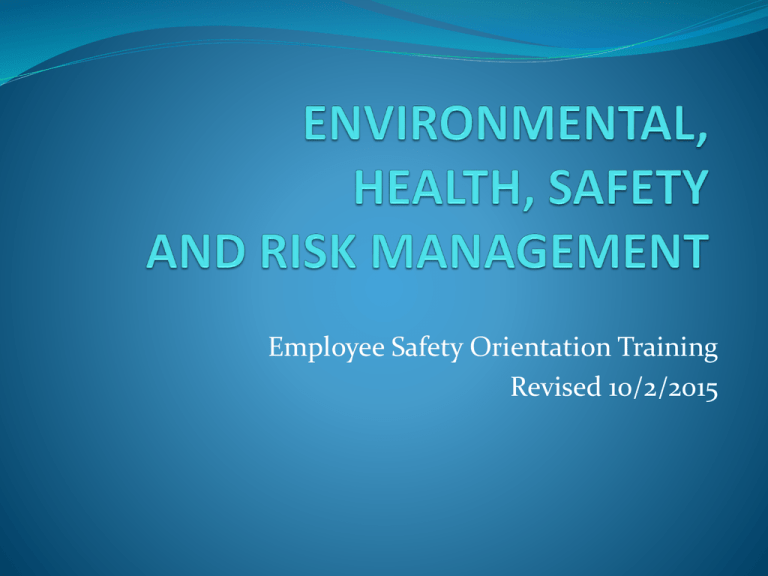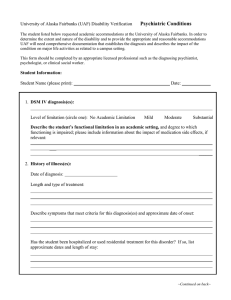Employee Safety Orientation Training Revised 10/2/2015
advertisement

Employee Safety Orientation Training Revised 10/2/2015 EHSRM Sections and Programs Occupational Safety Industrial Hygiene (IH) Ergonomics Program Environmental Protection of Minors Program Risk Management Hazardous Materials General Information Environmental, Health, Safety and Risk Management (EHSRM) Promotes and supports a safe and healthy campus environment Offers consultation and training in environmental, health, safety and risk management Establishes policies and procedures as they relate to EHSRM Investigates unsafe conditions, accidents and injuries Applies for and manages state and federally required plans and permits Is the main contact for all state and federal regulators and inspectors Occupational Safety Assisting you with Occupational Safety and Health Administration (OSHA) requirements and other nationally recognized health and safety directives. Some of the many ways we can assist: Unsafe Condition Reporting Program: Helping our UAF community remain safe by identifying and correcting campus conditions that could result in injury • Damaged handrails or walkways, exposed electrical wires, etc. • Promptly report identified unsafe conditions using the Origami portal on our website: http://www.uaf.edu/safety/unsafe-condition/ • UAF will not tolerate adverse treatment of any employee for choosing to report an injury or safety concern. You are protected by UAF policy and Alaska law! Occupational Safety Safety Assessments: We can provide an on-site safety evaluation of your workplace Accident/Incident Investigations: Investigate incidents to determine root causes and provide corrective action provisions to help prevent similar accidents/injuries Ice Cleat Program: Providing UAF employees and students with free ice cleats (traction devices) to help prevent slips and falls on ice/snow Remote Travel Emergency Plans (RTEP): Assisting in developing and reviewing UAF RTEPs which help ensure a safe trip afield Job Hazard Analysis (JHA): Providing specialized training and assistance to develop JHAs which identify workplace hazards and protective measures to control exposures to those hazards Occupational Safety Safety Awareness Incentive Program: Rewarding employees for voluntary participation in selected safety programs. Some of the ways employees can win incentive prizes include: - Completing all required safety training - Answering the monthly “Safety Challenge” question on our website - Submitting an “Unsafe Condition Report” from our website - Completing a JHA for our review - Watching for award activities on our Facebook page @ “UAF Safety and Risk Management” - Just by being observed working in a safe manner CONTACT INFO Gary Beaudette Kim Knudsen 474-2763 474-5476 Accident – Injury Reporting Report any instance of personal injury or illness, regardless of the severity Examples include: cuts/lacerations, injuries from slips and falls, chemical exposures, allergic reactions, muscle strains, repetitive motion/ergonomic injuries, debris in eyes, etc. Report injuries even when there is no lost work time, no medical treatment, or no loss of consciousness Report accidents/incidents within 8 hours How to Report an Incident Report the following incidents using the Origami Online Incident Reporting System, directly from our website: http://www.uaf.edu/safety/occupationalsafety/accident-reporting/ Employee incidents with or without injuries or illness (including student employees) Non-Employee injuries (including students and visitors) Unsafe Campus Conditions Damaged UAF or non-UAF Property and Vehicles Important Incident Reporting Reminders Call 911 when injuries require prompt medical treatment! Notify EHSRM immediately at 474-5413 0r 474-7721 (after hours), when an employee has been transported to the hospital for medical attention Overnight employee hospitalization must be reported to EHSRM as soon as practical, no later than 4- hours from the time the accident occurred Failure to promptly notify EHSRM of an overnight hospitalization can result in regulatory citations and penalties (fines) to the department! UA/UAF Incident Statistics Employee Recordable* Injuries 2012: (UA - 92) ~ (UAF - 61) 2013: (UA - 82 ) ~ (UAF - 61) 2014: (UA - 76) ~ (UAF - 55) Serious injuries trending down UA-wide since 2011. Some potential reasons for this trend include: Increased Safety Awareness and Prevention Safety Training and Incentive Programs Ice Cleat Program Improving Safety Culture * Recordable injuries are reported to Alaska Occupational Safety and Health based on criteria to include, but not limited to: days away from work and medical treatment beyond first aid Cost of Injuries - 2014 Of the 55 UAF Recordable Injuries in 2014…… The leading causes of injuries resulting in Worker Compensation claims were strain or injury by lifting, followed by slips and/or falls outside of buildings Paid Worker Compensation claims exceeded $580,908! Claims for outdoor slips, trips, and falls during the winter months (Oct-Apr) alone accounted for $97,447 Industrial Hygiene http://www.uaf.edu/safety/industrial-hygiene/ What is Industrial Hygiene? The anticipation, recognition, evaluation, and control of environmental factors in the workplace that may result in injury, illness, impairment, or affect the wellbeing of workers Industrial hygienists utilize engineering, work practice, and administrative controls as the primary means of reducing employee exposure to occupational hazards If you suspect a hazardous condition is present in your workplace or just have a question or concern, contact us to perform an evaluation. We are dedicated to the wellbeing of the UAF community. Industrial Hygiene Typical Industrial Hygiene Concerns Chemical - managing use in laboratories and facility shops Ventilation –fume hoods, snorkels, office air exchange Noise – assess noise levels in your work space Lasers and radiation – protection and training Infectious agents, allergens, mold – sampling and assessment Indoor Air Quality - CO2, temperature, odors Occupational health - respirators, hearing tests Assist in selecting personal protective equipment CONTACT INFO Andy Krumhardt Tracey Martinson 474-5197 474-6771 Ergonomics http://www.uaf.edu/safety/industrial-hygiene/ergonomics/ Ergonomics is an applied science that coordinates the design of devices, systems and physical working conditions with the capacities and requirements of the worker. So If something in your workspace doesn’t feel right - you probably need an ergonomic assessment The Ergonomic Program offers Training and Awareness Workstation Evaluations Corrective Actions and Recommendations Don’t postpone calling if something hurts – we may be able to help CONTACT INFO Carol Shafford 474-5413 Environmental UAF is regulated by state/federal agencies; we have the following permits and plans State Air Quality operating permit – main campus State Stormwater Discharge Permit and Plan– main campus Federal Spill Prevention, Control, and Countermeasure Plan (SPCC) for oil spills – all campuses and facilities GHU Wastewater Discharge Pretreatment Plan – main campus, Lena Point, UAF hanger Federal 90 day Hazardous Waste Accumulation Point permit – main campus Federal Wetland Permits – project specific Environmental You need to contact us when You spill a hazardous material or oil, including petroleum products and vegetable oil You are installing a stationary, fossil-fuel burning piece of equipment like a boiler, generator, furnace, woodstove, kiln, heater, pump You are installing a new or replacement above ground or underground oil tank You are disturbing soils/ground for reasons including installation of a building, a research project, a parking area, etc. You are changing drainage patterns on main campus with culverts, fill, ditching, etc. CONTACT INFO Thadd Williamson 474-2762 Frances Isgrigg 474-5487 Protection of Minors http://www.uaf.edu/safety/minors/ A minor is a person under the age of 18 years. UAF promotes and engages in many programs, events and activities that involve Minors To provide a safe environment, two trainings: Awareness Training through United Educators; and Policy and Reporting training If you are involved in an activity that includes minors - camps, summer sessions, lab work, mentoring or other programs: You may need a background check Your participant’s guardians/parents may need to sign a waiver Consult with EHSRM for guidance CONTACT INFO Frances Isgrigg 474-5487 Risk Management http://www.uaf.edu/safety/risk-management/ Identify, assess, and manage risks on and off campus Program Risk Assessments: identify potential risks, evaluate, and find ways to manage risk by controls, modifications, or by transferring the risk through insurance or contract/waiver language Volunteer Approval Process: http://www.uaf.edu/safety/risk- management/uaf-volunteers/ Travel Evaluations and Recommendations: abroad, remote, chartered planes and boats, with family, friends, students, volunteers or employees http://www.uaf.edu/safety/risk-management/travel/ Event & Student Activity Reviews: You may need an event form if you have 50+ people or folks from off campus are attending. http://www.uaf.edu/safety/risk-management/events/forms-contracts/ If you believe there may be some risk involved in your activity you should contact risk management Risk Management Identify, assess, and manage risks . . . Cont’d Loss Prevention Program: approval of funding for initiatives that reduce our potential losses through accidents or injury to people or other incidents that may cause damage to property or equipment Protection of Minors: implementation of policies and guidelines; conducting risk assessments on and off campus for events, activities, summer sessions, and camps for minors (individuals under the age of 18) Reviews and updates contracts, agreements and waivers Contract Reviews for procurement of services, grants and research funding, independent contractors, facility use agreements, and Memorandum of Agreements Risk Management Reviews insurance and liability for the University Certificate of Insurance: manage requests for proof of insurance Insurance Coverage: understanding and explaining your options for department and program insurance coverage which includes, but is not limited to property, auto, professional liability Any and ALL Liability language review: liability language is language that places liability on UAF within contracts, memorandums of agreement or use, rental agreements with other parties CONTACT INFO Frances Isgrigg 474-5487 Hazardous Material (HM) Your Friendly HAZMAT Resource For management and removal of Batteries Biohazardous Waste, Sharps Chemical Waste Used Oil Hazardous Materials (HM) For Assistance with Emergency response & spill cleanup Hazardous materials shipping information Liquid nitrogen deliveries Off campus hazardous materials management Chemical Inventories and Waste Pickup Requests Environmental, Health, and Safety (EH&S) Assistant Program Web-based management program for your convenience Manage your Chemical Inventory Online Request Safety Data Sheets (formally known as Material Safety Data Sheets or MSDS) through the MSDS Online database Request a hazardous waste pickup online Guidance, tutorials, and access can be found on the EHSRM website http://www.uaf.edu/safety/hazardous-materials/ehs-assist/ CONTACT INFO Need assistance, please contact us: Richard Deck 474 – 5617 Kris Riley 474-7889 Your Job Complete all basic safety training - Must be completed within 10 days of hire or prior to exposure to a hazard (http://www.uaf.edu/safety/training/) Work with your supervisor to determine additional EHSRM training and review your Department Emergency Action Plan (DEAP) Review the workplace assessment training questionnaire (http://www.uaf.edu/safety/training/) to determine other regulatory training Be alert to hazards and report safety concerns to your supervisor or through Origami Risk. (http://www.uaf.edu/safety/unsafe-condition/) Your Job Notify us of the following Regulators on-site 474-5413 Unmet training needs 474-5413 Report Accidents/Injuries www.uaf.edu/safety/ Unsafe conditions www.uaf.edu/safety/ Any oil or HM spills 474-5413 Campus Events 474-5487 Asbestos concerns 474-7000 Stinky smells 474-6771 HAZMAT shipping 474-5617 Hearing or respiratory issues Minors on Campus 474-5487 Installation of oil tanks or stationary fuel burning equipment 474-5487 Prior to excavations 474-5487 Tower or roof work 474-2763 Remote Travel Plans 474-2763 474-6771 IF THIS IS AN EMERGENCY – CALL 911 Contact Info Occupational Safety Ergonomics Gary Beaudette Carol Shafford cashafford@alaska.edu Industrial Hygiene Tracey Martinson 474-6671 tamartinson@alaska.edu Environmental Thadd Williamson 474-2762 tlwilliamson@alaska.edu Frances Isgrigg 474-5487 fisgrigg@alaska.edu Training Thadd Williamson tlwilliamson@alaska.edu 474-2762 474-2763 gsbeaudette@alaska.edu Kim Knudsen 474-5476 klamb1@alaska.edu Thadd Williamson 474-2762 tlwilliamson@alaska.edu Hazardous Material and Waste Richard Deck 474-5617 redeck@alaska.edu Kris Riley kcriley@alaska.edu 474-7889 Risk Management and Minors Frances Isgrigg 474-5487 fisgrigg@alaska.edu http://www.uaf.edu/safety/
